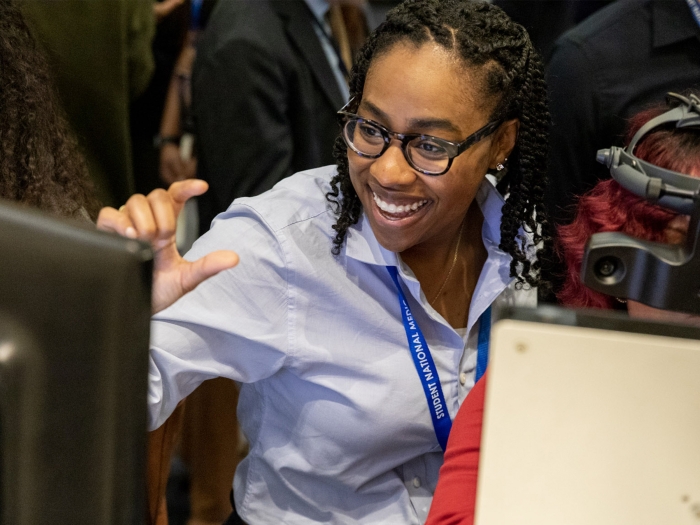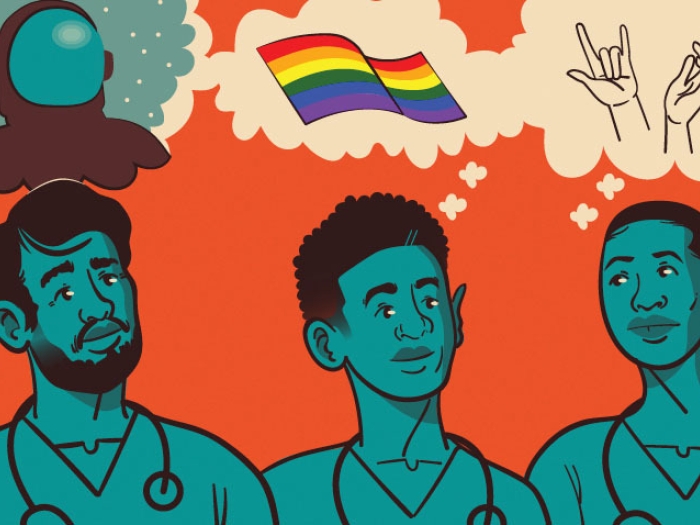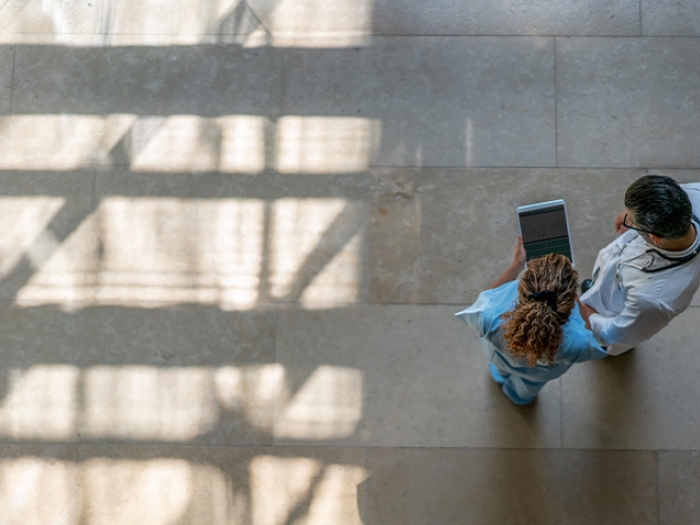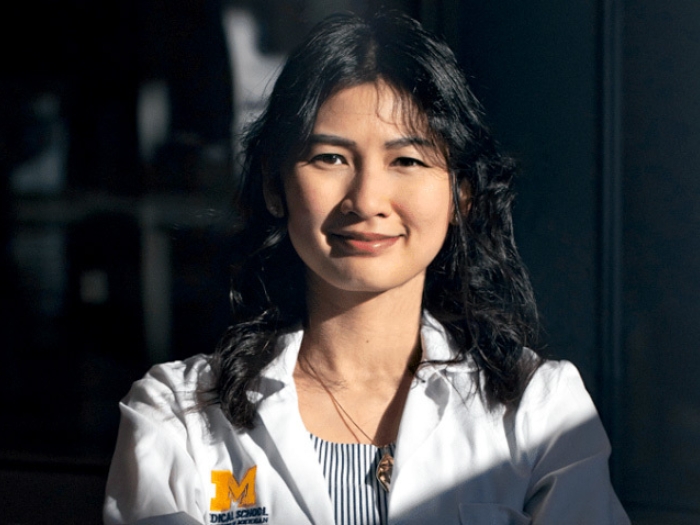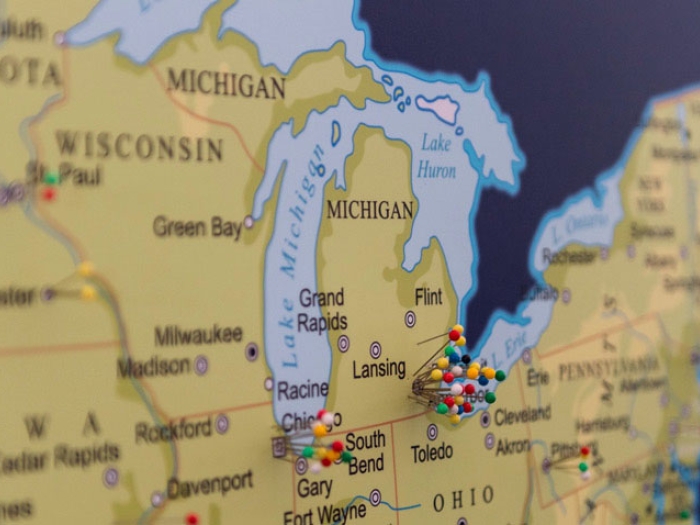Her M3 year brought new challenges and insight. A U-M med student shares personal tips for approaching a pivotal part of the educational process.
1:00 PM
Author |
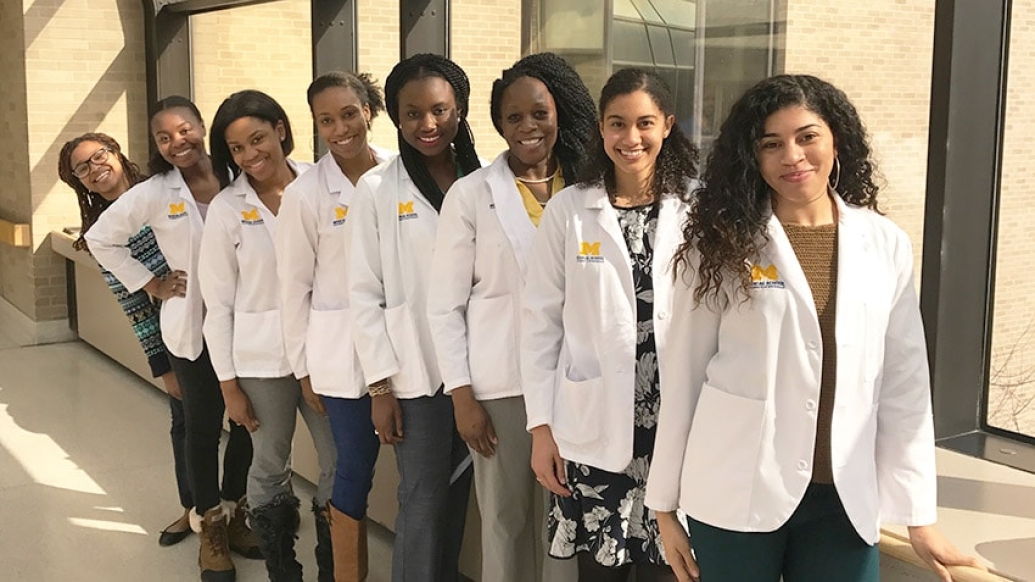
After 10 months and countless hours on the wards and studying, I can finally say that M3 year is over.
MORE FROM MICHIGAN: Subscribe to our weekly newsletter
It feels a little surreal to call myself an M4, but I can say that I'm definitely adjusting to the lifestyle and that I'm incredibly excited to do electives in my areas of interest. While it was a nice experience to get a little taste of everything over the past three years, scheduling electives in my areas of interest feels like coming home in a way.
I'm still trying to decide on a specialty, but I can say with some certainty that my mindset is medical, not surgical. I feel like I know what I want to do deep down, but am still somewhat afraid to admit to myself and to others that I have found something that really feels right.
I'll be doing some soul-searching over the next few months, but I can't wait until the day that I can say that I'm committed to a specialty.
I've also had some time to think. It has become a yearly tradition of mine to talk about a few lessons that the past year has taught me, and I feel like it's only right to keep that going. That said, here are 10 things I learned as an M3:
Be open.
I started med school thinking that I knew exactly which specialty that I would go into. Then, when I rotated on that specialty, I found myself somewhat unfulfilled (which brought on a nice bout of panic because I didn't love the one thing that I was convinced that I would be doing forever).
In all of my musings, my mind kept going back to two specialties in which I never thought I would be interested, and I realized that these two specialties just felt right. If I have one piece of advice for people starting on the wards, it's to be open. You never know what rotations will surprise you in both good and bad ways.
There is something to be learned from every rotation.
While you might not enjoy every rotation due to the subject matter, the personalities, etc., there is always something to learn from every specialty.
I'll use surgery as an example, since I'm fairly certain that I won't be entering a surgical specialty. I actually liked my surgery rotation (except for the 4 o'clock mornings). Three of the most valuable skills that I learned during the rotation were how to run a really good subcutaneous stitch, how to tie knots that won't fall out and which indications warrant a surgical consult.
SEE ALSO: How Medical Schools Can Better Support Students with Disabilities
There may come a time when I need to suture a superficial cut and tie some knots; I feel like I can do that now. Also, I feel better about knowing when to call a surgical consult so as not to waste the surgeons' time when surgery will likely not fix the problem.
There will be bad days.
Medicine is unique in that it is a career where you sometimes see patients in their most vulnerable states. People tell their doctors things that they don't tell anyone else, and while this signifies a strong doctor-patient relationship, no one ever talks about the impact that this may have. Patients have told me some truly horrifying things — and more than once this year, I have questioned the goodness of humanity.
While no match for the emotions and experiences of the patients, being exposed to their stories can also be incredibly difficult on medical professionals at every level of training. These are the times when I depended on my friends and colleagues to get me through the bad days. When we lean on each other, we make sure that everyone makes it.
With the high rates of depression and suicide in medicine, it is incredibly important that we help others when they're struggling and reach out to others when we're the ones having a difficult time. Medicine doesn't have to be as brutal as it has been in the past, and a huge part of that is being open and vulnerable with trusted colleagues. There will be bad days in medicine — the important thing is what we do about them.
It's OK to cry.
Full disclosure: I'm not really a crier. I have to be highly distressed or extremely angry to cry, but it definitely happened this year. I can also say with confidence that I'm not ashamed of it. I saw some truly traumatic and distressing situations this year, and therefore, I am not afraid to admit that these situations bothered me.
I cried the first time that I saw a patient die and after a particularly distressing encounter with a patient (in the bathroom at the hospital, no less). It reminds me that I'm still a person, and that is something that I can be proud of.
Life goes on.
Sometimes, it can be easy to forget that there is a life outside of medicine and that it is continuing to go on whether we notice it or not. Two people that I love very much passed away unexpectedly while I was on rotations this year. At the other end of the spectrum, several of my friends were married or had babies.
The world keeps spinning, the sun keeps rising, and if we forget to remember this, we miss out on life. Medical school is not the death of our old lives but rather a continuation with a slightly different spin and a new (but not singular) priority. I admit that I'm very bad at this, but the events that happened this year made me reassess my priorities and remember that my life outside of med school was equally important to my life in it.
SEE ALSO: Representation Is Crucial. So Retention of Pre-Med Students of Color Is Imperative
Lean on your people.
More than ever this year, I depended on the people in my life who support me. Not only did I rely on family and friends, but this year I also looked to the people right next to me in the trenches.
There is something very special about the bonds that are formed during med school, and there is a lot to be said about those who understand exactly what you're going through because they are also living it. This year, my support system kept me sane and focused when I lost sight of my goals. I can't imagine having to do this without them — I'm quite sure that I couldn't.
The work-life imbalance is temporary.
As much as I strive for balance, I always feel like I never quite achieve it. Work always wins out for me, and I feel as if it has been particularly difficult to incorporate exercise and relaxation into my days this year.
There have definitely been a couple of stretches where I didn't exercise for several weeks straight; I always felt awful afterwards. It's incredibly difficult to maintain balance on some of the more involved rotations, but I always tried to do one nice thing for myself on each day off (even if it was just sleeping past 4 a.m. — ahem, surgery rotation).
One of the things that I'm looking forward to in the next year is having more free time to explore my interests outside of medicine. While some of the rotations will be intense this year, others are very outpatient-heavy and will allow lots of time for exercise and other extracurricular activities.
Celebrate the small victories.
Even though it sometimes feels as if the small victories are few and far between, it's important to celebrate them when they do happen. In a training program that is years long, when at times it feels like there is no end in sight, the small victories can help get us through the dark times.
Sometimes, the small victories are a really positive and inspiring patient interaction where you feel as if you helped make a difference for a patient. Or it might be a small victory to simply make it through the week on a difficult rotation. There is much to be learned from small victories.
You will find your people.
I don't mean the people who support you this time, though they are incredibly important, too. This time, I mean the field in which you belong, your future specialty. Shortly after meeting the residents in the two fields that I'm considering, I knew that they were my people. We shared a similar thought process and got really excited about the same things. They practiced medicine in the way that I had always dreamed I would.
The fit was right, and there was absolutely no point in fighting it because I had found the fields where I would be happy. This year, I spent a lot of time trying to pick a specialty based on a list of pros and cons, but in the end, it was all about the feel. It was about the rotations that made me excited to come to the hospital before the sun was up every day.
I found the places that I fit, and when it happened, I knew without question that I belonged. It's a really fantastic feeling.
I still can't imagine doing anything else.
The intersection between medicine and public health is still my happy place. Even after all of the bad days, the angry rants, the tense moments and the days spent questioning my life choices, I can't imagine doing anything else but this.
All it takes is a good patient interaction or an interviewee asking if I would still do this again to remind me that there is nothing else in the world that I would rather be doing. Even though there are lots of anxiety-provoking moments coming up in the next year (choosing a specialty, clinical knowledge exams, residency applications, residency interviews, the Match), I realize that I am living the dream that I've had since I was a child. I wouldn't trade that for anything in the world.
It's time to get back to work, I guess. This year has been a challenging one in many ways but I am always amazed to see the growth that occurred in my peers and myself because of it. I can only hope that the next year brings as much growth and clarity as this one has.
This article was originally published on Dose of Reality, the blog of the University of Michigan Medical School.

Explore a variety of healthcare news & stories by visiting the Health Lab home page for more articles.

Department of Communication at Michigan Medicine
Want top health & research news weekly? Sign up for Health Lab’s newsletters today!
